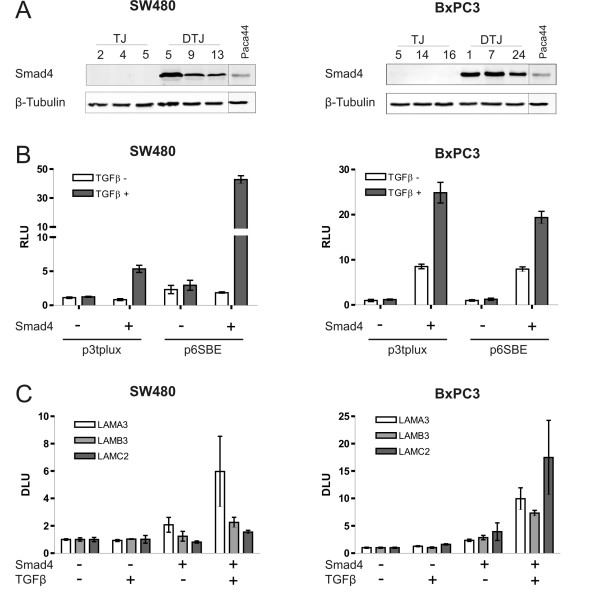Figure 1.
Restoration of TGFβ responsiveness through reexpression of Smad4. Smad4 expression was stably restored by retroviral transduction in Smad4-deficient human SW480 colon carcinoma and BxPC3 pancreatic adenocarcinoma cells. A Western blot analysis for the human Smad4 protein on total protein extracts of each three Smad4-negative and Smad4-positive clones of SW480 and BxPC3 cells, respectively (TJ: empty vector control clones, DTJ: Smad4- (DPC4) positive clones, Paca44 as a representative cell line to compare for "normal" endogenous expression levels). B Transient transfections with p3Tplux and p6SBE reporter vectors. Normalized promoter activity of p3Tplux (a fusion construct of the PAI-1 and collagenase-1 promoters harboring AP1 sites) and p6SBE (a 6fold concatemer of the SBE site) as analyzed in transient transfections of TGFβ-treated (24 h) and -untreated Smad4 negative and Smad4 reexpressing cells. Experiments were repeated in triplicates with the three clones shown in Fig. 1A and bars show the mean values with the standard error of the mean. C Reexpression of Smad4 in Smad4-deficient human colon and pancreatic carcinoma cells leads to increased basal and/or TGFβ induced laminin-332 expression. Quantification by phosphor image analysis of Northern blot results with RNAs prepared from TGFβ-treated (24 h) or -untreated Smad4-negative and Smad4-positive SW480 (mean value of each three clones analyzed in two approaches) and BxPC3 (mean value of each two clones in two separate approaches) cells, normalized to GAPDH expression.

